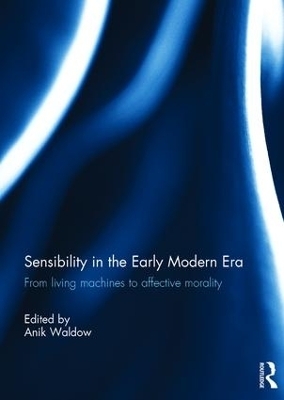
Sensibility in the Early Modern Era
Routledge (Verlag)
978-1-138-65097-8 (ISBN)
This collection focuses on these connections by offering reflections on the role of sensibility in the early modern attempt to think of the human being as a special kind of sensitive machine and affectively responsive animal. Humans, as they are understood in this context, relate to themselves by sensing themselves and perpetually refining their intellectual and moral capacities in response to the way the world affects them. Responding to the world here refers to the manner in which both natural and man-made influences impact on our ability to conceptualise the animate and inanimate world, and our place within that world. This book was originally published as a special issue of the Intellectual History Review.
Anik Waldow is Senior Lecturer in the Philosophy Department at the University of Sydney, Australia. She mainly works in early modern philosophy, and has published articles on the moral and cognitive function of Humean sympathy, early modern theories of personal identity, scepticism, and associationist theories of thought and language. She is the author of the book David Hume and the Problem of Other Minds (2009) and the co-editor of Contemporary Perspectives on Early Modern Philosophy: Nature and Norms in Thought (2013).
Introduction 1. Self and Sensibility: From Locke to Condillac and Rousseau 2. The Camera Obscura and the Nature of the Soul: On a Tension between the Mechanics of Sensation and the Metaphysics of the Soul 3. Striving Machinery: The Romantic Origins of a Historical Science of Life 4. Sensibility and Organic Unity: Kant, Goethe, and the Plasticity of Cognition 5. "Je n’ai jamais vu une sensibilité comme la tienne, jamais une tête si délicieuse!": Rousseau, Sade, and Embodied Epistemology 6. The Artifice of Human Nature: Rousseau and Herder 7. Seduced by System: Edmund Burke’s Aesthetic Embrace of Adam Smith’s Philosophy
| Erscheinungsdatum | 02.06.2016 |
|---|---|
| Verlagsort | London |
| Sprache | englisch |
| Maße | 174 x 246 mm |
| Gewicht | 385 g |
| Themenwelt | Geisteswissenschaften ► Philosophie ► Erkenntnistheorie / Wissenschaftstheorie |
| Geisteswissenschaften ► Philosophie ► Ethik | |
| ISBN-10 | 1-138-65097-8 / 1138650978 |
| ISBN-13 | 978-1-138-65097-8 / 9781138650978 |
| Zustand | Neuware |
| Haben Sie eine Frage zum Produkt? |
aus dem Bereich


